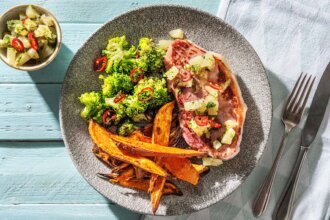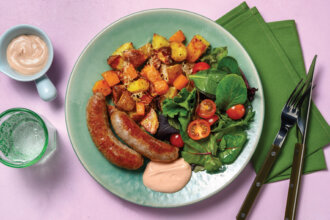How to Make Curry Less Spicy
June 20, 2023Imagine spending time and effort making an incredible curry from your Indian recipe, but after a quick taste to check the seasoning, there’s a problem. The simmering spices may intensify more than expected, resulting in an overly spicy curry. If you’re unsure how to reduce spiciness when preparing chicken korma or how to cool down a Thai prawn curry recipe, read on for some tips.
What makes curry spicy?
The heat in a curry comes from the chilli you use, whether it’s fresh chillies, flakes or powder. All chillies contain a compound called capsaicin – and the amount they contain depends on how hot that chilli is on the Scoville scale.
Some people have more of a tolerance for capsaicin than others. What’s mild to some may be spicy to others – “mild” is subjective, and that’s the reason why cooling down a curry might be necessary.

What are the hottest curries?
Some of the spiciest recipes for curry that are available include jalfrezi and vindaloo, which are classic dishes renowned for their spicy sauces. Most of the hottest curry dishes include a spicy ingredient called bhut jolokia, which is officially the spiciest chilli in the world and originates from Nagaland. However, if you’re not in the market for a hot curry that will make your taste buds tingle, you can make your curry less spicy by following the instructions in this guide.
How to make curry less spicy
It might be that you’ve made a recipe before and the heat levels were too high. There are two main ways to make a hot curry milder. The first is simply to reduce the amount of chilli you add. You’ll still get the same great flavours, just with a milder chilli kick. Recipe Development Manager, Mimi Morley, also suggests keeping the quantities of all spices the same, but adding more of the other ingredients. Even making double the quantity of curry, with the regular amount of spices, is a great way to reduce the heat without compromising on flavour.
How to reduce heat in curry
There are various ways to make a curry less spicy – the method you choose depends on the type of curry you’ve made, the ingredients and flavours it contains and, of course, what you’ve got available in your kitchen.
Coconut milk, like in this mild Mumbai coconut chicken soup recipe, can cool down a spicy curry, but only if the flavours complement the dish; for example, coconut milk works well in coconut-based Thai curries like this green chicken curry recipe. Alternatively, a dash of milk can also work well, but make sure it doesn’t split when cooking.
A dollop of sour cream or yoghurt on top is also a good way to cool a curry down. It’s also worth learning how to cool down a hot curry by using sugar. Adding a pinch of sugar can reduce heat levels – just be sure to taste each time before adding too much.
If your curry has a tomato base, adding extra tomatoes is a great way of cooling down a hot curry. The choice of using tinned tomatoes, passata, fresh tomatoes or even ketchup is up to you.
Another way to reduce heat in curry is by using starch. Adding potatoes or sweet potatoes to a curry, like this easy creamy Indian chicken curry with sweet potato recipe, will absorb some of the heat. Serving your curry with a side such as potatoes or rice gives you bland flavours to counteract the bold spices.

For those seeking to learn how to cool down a spicy curry, a final tip is to use acidic flavours. Lemon juice, lime juice or vinegar can take away some of the intensity of chilli heat. HelloFresh’s Recipe Development Manager, Mimi Morley, recommends tasting your curry sauce after you’ve made it, but before you serve, as you may want to add a pinch of sugar afterwards to balance out the tartness.
How to make a chilli con carne less spicy
Similar rules apply to a chilli con carne. If you’re wanting to make chilli con carne less spicy, simply add less chilli while you’re cooking. But if you want to cool down chilli con carne after you’ve already made it, try adding a pinch of sugar or more ripe tomatoes – or serve with sour cream to counteract some of the heat.
Mild spicy curry recipes
There’s no need to cool down a curry with this mild chicken korma recipe. It’s easy to customise, too: Hannah Gilbert suggests sprinkling a mix of red chilli, toasted coconut and fresh coriander over the top for those who like their korma a little spicier.
- To serve two people, add 300ml water to a saucepan and bring to a boil.
- Once boiling, add 150g of basmati rice, stir, cover the pan and reduce the heat to medium. Cook for 10 minutes, remove from the heat and put to one side (still covered) for another 10 minutes or so.
- Place a large frying pan over high heat and add a drizzle of oil. Once hot, add 280g of diced chicken, reduce the heat slightly and fry for 4-5 minutes until golden brown. If the core temperature (where the chicken is thickest) is 60°C for 45 minutes, 65°C for 10 minutes, 70°C for two minutes, 75°C for 30 seconds and 80°C for six seconds, then it has reached its perfect temperature. You could use tofu or cheese for this veggie/vegan korma with halloumi recipe instead.
- Drizzle over half a sachet of honey and stir to coat.
- Add a pack of mangetout and a pot of our Korma spice mix and cook while stirring for 1 minute.
- Add 100ml of water and chicken stock powder and simmer for 3-4 minutes.
- Stir through creme fraiche, bring to the boil, and then reduce the heat to low.
- Add ground almonds and simmer until the sauce is creamy. Season with salt and pepper if needed, fluff up the rice and serve – topped with the chilli mixture if you wish.
Recipes for cooler curries
There are various HelloFresh recipes for milder curries. Rather than cooling down a spicy curry, try making a less spicy curry – like one of these:
- Thai Red Chicken Curry Recipe
- Thai Yellow Fish Curry Recipe
- Caribbean Prawn Curry & Cauli-Rice Recipe
- Mumbai Cauliflower Curry Recipe
Expand your repertoire of milder curries by searching the HelloFresh recipe hub for more ideas, ranging from mild curries to spicier options, where the heat can be easily adjusted to your liking.







